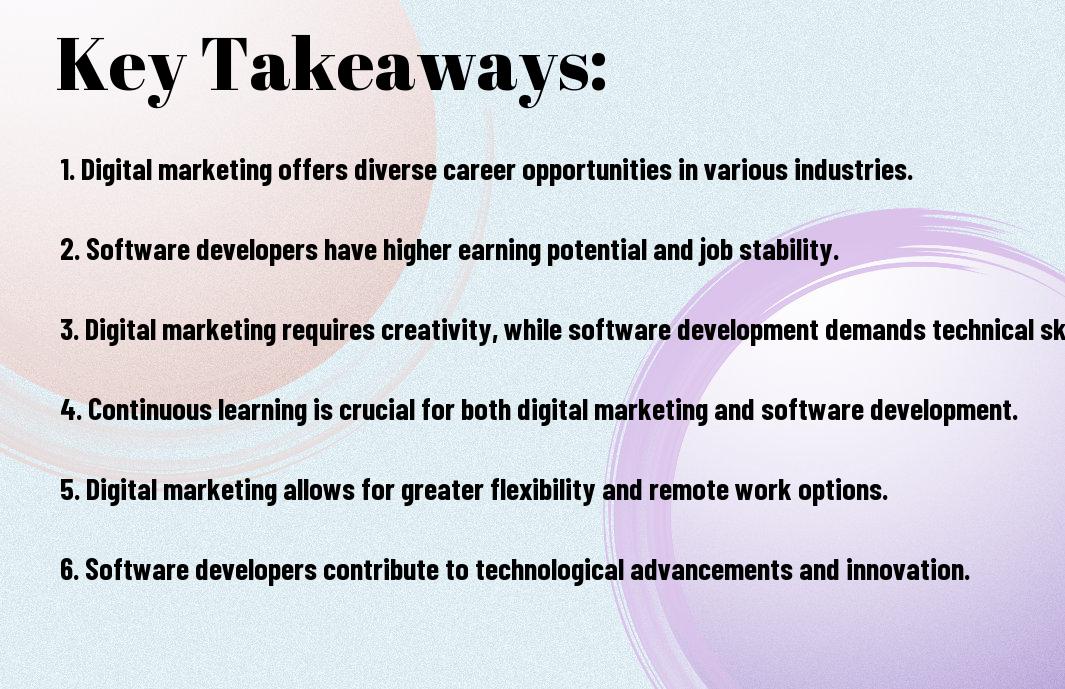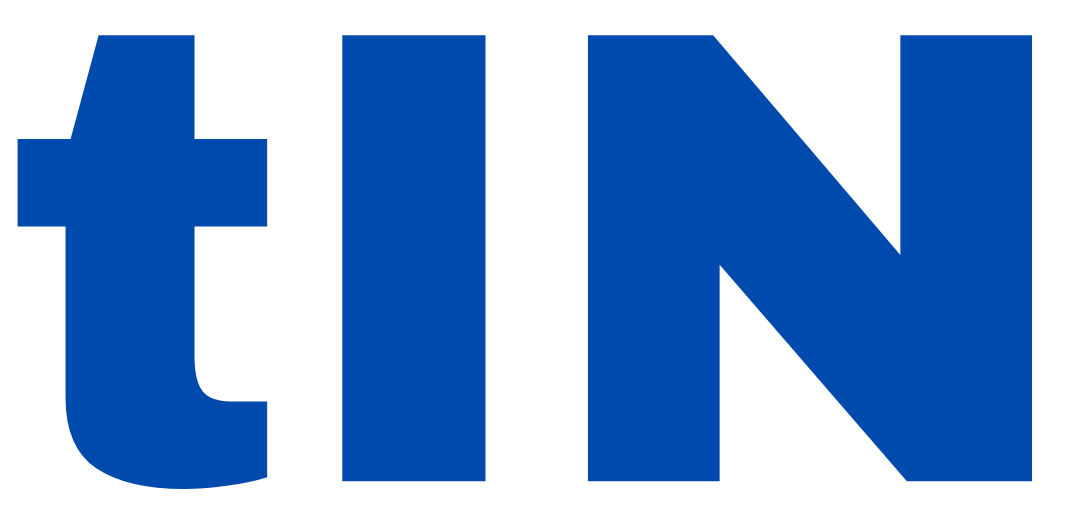Welcome to our blog post where we delve into the question of whether digital marketing or software development is the better career path for you. Making a decision as important as choosing a career can be daunting, but fear not, for we are here to provide you with valuable insights to help you determine the best fit for your future. Both digital marketing and software development offer unique opportunities, challenges, and rewards, so it is crucial to consider the risks and benefits involved in each field before making your choice.

Analyzing the Role of a Digital Marketer
Obviously, when deciding between a career in digital marketing or software development, it’s crucial to understand the role and responsibilities of a digital marketer. In today’s technology-driven world, businesses are increasingly relying on digital marketing strategies to reach their target audience and achieve their goals. As a digital marketer, you play a vital role in helping companies establish their online presence, drive traffic to their websites, and ultimately convert leads into customers.
The Importance of Digital Marketing in Today’s World
Digital marketing has become an integral part of the business landscape, and its importance cannot be overstated. With more than half of the global population now using the internet, businesses must leverage digital platforms to gain a competitive edge. Effective digital marketing allows you to reach a vast audience, regardless of geographical boundaries, and connect with potential customers in a meaningful way. It enables you to create targeted campaigns, track user behavior, and optimize your strategies for optimum results.
Key Skills and Responsibilities of a Digital Marketer
As a digital marketer, you possess a set of distinct skills and responsibilities that are crucial for success in this field. Firstly, you need to have a deep understanding of various digital marketing channels, such as search engine optimization (SEO), social media marketing, email marketing, pay-per-click (PPC) advertising, and content marketing. Your goal is to create integrated campaigns that leverage these channels to generate leads and drive conversions.
In addition to channel expertise, a digital marketer should be proficient in data analysis and interpretation. You must have the ability to analyze campaign metrics, identify trends, and extract actionable insights that can optimize your marketing efforts. Strong analytical skills allow you to make informed decisions, prioritize marketing initiatives, and allocate resources effectively.
Furthermore, as a digital marketer, you play a critical role in creating compelling content that resonates with your target audience. Whether it’s writing engaging blog posts, creating captivating social media posts, or developing persuasive email copy, your content should be authentic, relevant, and tailored to the needs and preferences of your audience. You need to possess strong communication skills and stay updated with the latest trends and best practices to ensure your content remains fresh and impactful.
To excel in digital marketing, you must also have a creative mindset. Thinking outside the box and coming up with innovative ideas is essential to stand out from the competition and create memorable experiences for your audience. Additionally, staying adaptable in a rapidly evolving digital landscape is crucial. Digital marketers must stay updated with emerging technologies, digital platforms, and industry developments to ensure their strategies remain effective and their businesses stay ahead.
In summary, the role of a digital marketer encompasses various skills and responsibilities. From understanding the importance of digital marketing in today’s world to possessing expertise in different channels, data analysis, content creation, and adaptability, you play a vital role in helping businesses thrive in the digital realm. So, if you are passionate about driving measurable results, connecting with people online, and being at the forefront of technological advancements, a career in digital marketing could be a perfect fit for you.
Breaking Down the Profession of a Software Developer
The field of software development is an enticing career choice that has gained immense popularity in recent years. As technology continues to advance at a rapid pace, the demand for skilled software developers has skyrocketed. In this chapter, we will delve into the intricacies of the profession, guiding you through the evaluation of its impact and the essential qualities and duties that make software developers indispensable.
Evaluation of the Impact of Software Development
When considering a career in software development, it is crucial to understand the profound impact this profession has on various industries. In today’s digital era, software developers play a vital role in shaping the technological landscape. Whether it’s developing applications, designing websites, or creating sophisticated algorithms, software developers have the power to revolutionize how we interact with technology and enhance our daily lives. With the increasing reliance on digital platforms in almost every aspect of our lives, the influence of software development is only set to grow.
Essential Qualities and Duties of a Software Developer
To excel in the field of software development, there are certain qualities and duties that you must embrace. Firstly, a strong problem-solving ability is paramount. As a software developer, you will be tasked with identifying and resolving complex issues, often requiring you to think outside the box and devise innovative solutions. Additionally, attention to detail is a fundamental requirement as even a minor error in code can have significant consequences. Moreover, effective communication skills are crucial as you will frequently collaborate with team members and clients to understand their requirements and deliver optimal solutions.
Furthermore, adaptability is key in this ever-evolving field. Technology is constantly evolving, and as a software developer, you must remain up-to-date with the latest trends and programming languages. Acquiring new skills and continuously improving your knowledge base is essential to stay competitive and meet the ever-changing demands of the industry. Moreover, being able to work under pressure and meet tight deadlines is imperative as software development projects often have strict timelines.
Overall, a career as a software developer offers immense opportunities for growth and professional development. By continuously honing your skills, keeping up with industry trends, and embracing the responsibilities that accompany this profession, you can pave the way for a successful and fulfilling career in the ever-expanding realm of software development.
Comparative Analysis: Digital Marketing Vs. Software Development
Lasting comparison between digital marketing and software development can help you make an informed decision about which field aligns better with your interests and career goals. Assessing various factors such as salary, career growth, and job satisfaction can provide valuable insights into the advantages and disadvantages of these two distinct yet equally rewarding domains.
Considering Factors like Salary, Career Growth, and Job Satisfaction
When it comes to determining the most suitable career path for you, it’s crucial to take into account factors like salary, career growth opportunities, and job satisfaction. Digital marketing professionals are sought after due to the increasing demand for online promotion and branding. While the entry-level salaries in digital marketing might be relatively lower compared to software development, the potential for exponential growth is significant. As you gain experience and become more proficient in various digital marketing strategies, you can gradually climb up the ladder and command a higher salary.
On the other hand, software development is known for its competitive compensation packages right from the start. As a software developer, your technical skills and problem-solving abilities hold immense value in the market. With a strong foundation in programming languages and a solid understanding of software engineering principles, you can secure high-paying job opportunities. However, it is important to note that your salary growth in software development might not be as steep as in digital marketing without consistently upgrading your skills.
Job satisfaction is subjective and can vary from person to person. In digital marketing, the ever-changing landscape and the constant need to stay up-to-date with evolving digital trends can keep you engaged and motivated. You may find excitement in crafting impactful online campaigns, analyzing data to drive marketing strategies, and witnessing the tangible results of your efforts.
Software development, on the other hand, offers the satisfaction of building innovative and functional software products. The joy of seeing your code come to life and positively impacting users’ lives can be immensely rewarding. However, it’s worth noting that the nature of software development can sometimes be demanding, requiring attention to detail and continuously adapting to new technologies.
- Salary: Digital marketing may have lower entry-level salaries, but potential for exponential growth. Software development offers competitive compensation packages from the start.
- Career Growth: Digital marketing allows you to climb the ladder as you gain experience and expertise. Software development requires consistent skill upgrades for significant growth.
- Job Satisfaction: Digital marketing offers excitement through crafting impactful campaigns and analyzing data. Software development provides satisfaction in building functional software products but requires attention to detail and adaptability.
After considering these factors, you need to assess your priorities, skills, and long-term career goals to determine which domain better suits you and your aspirations.
Exploring the Future Scope in Both Domains
The future holds immense opportunities for growth in both digital marketing and software development. The reliance on digital platforms for business operations and customer engagement continues to grow, making digital marketing a crucial aspect of any company’s success. As technology advances, the demand for skilled digital marketers who can navigate social media, content marketing, search engine optimization, and other online channels is expected to rise.
Similarly, software development remains at the forefront of technological innovations. The integration of artificial intelligence, machine learning, and the Internet of Things (IoT) into various industries creates a continuous need for talented software developers. By staying up-to-date with emerging technologies and honing your programming skills, you can position yourself for future career opportunities and advancements.
It’s important to keep in mind that the future scope of both domains is influenced by ongoing advancements and industry trends. Continuously evaluating and adapting to these changes will be crucial for staying relevant and seizing new opportunities.
Difference Between Digital Marketing vs. Software Engineer
From above, you now have a clear understanding of the key differences between digital marketing and software development. Both fields offer unique opportunities and require distinct skill sets. If you prefer a dynamic industry that emphasizes creativity, client interaction, and staying ahead of the latest digital trends, digital marketing may be the best fit for you. On the other hand, if you have a passion for problem-solving, and logical thinking, and enjoy the technical aspects of building software systems, becoming a software developer could be your ideal career path. Ultimately, the choice depends on your interests, skills, and long-term goals. Take the time to evaluate your strengths and preferences, as well as the current demand and future prospects of each field, to make the best decision for your future success.






